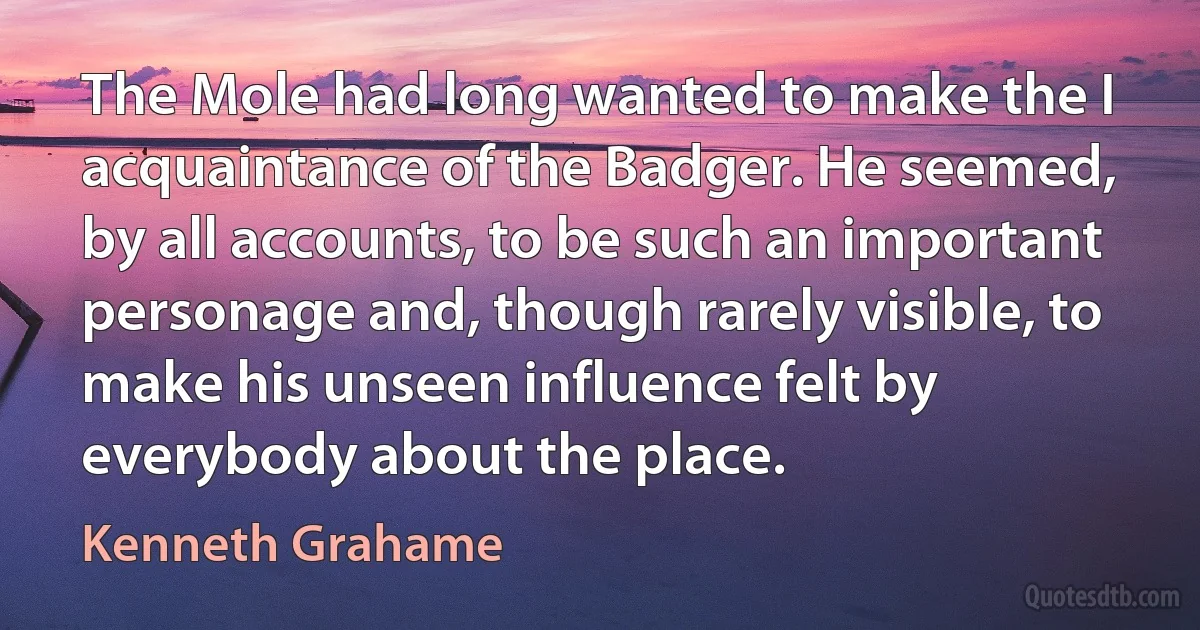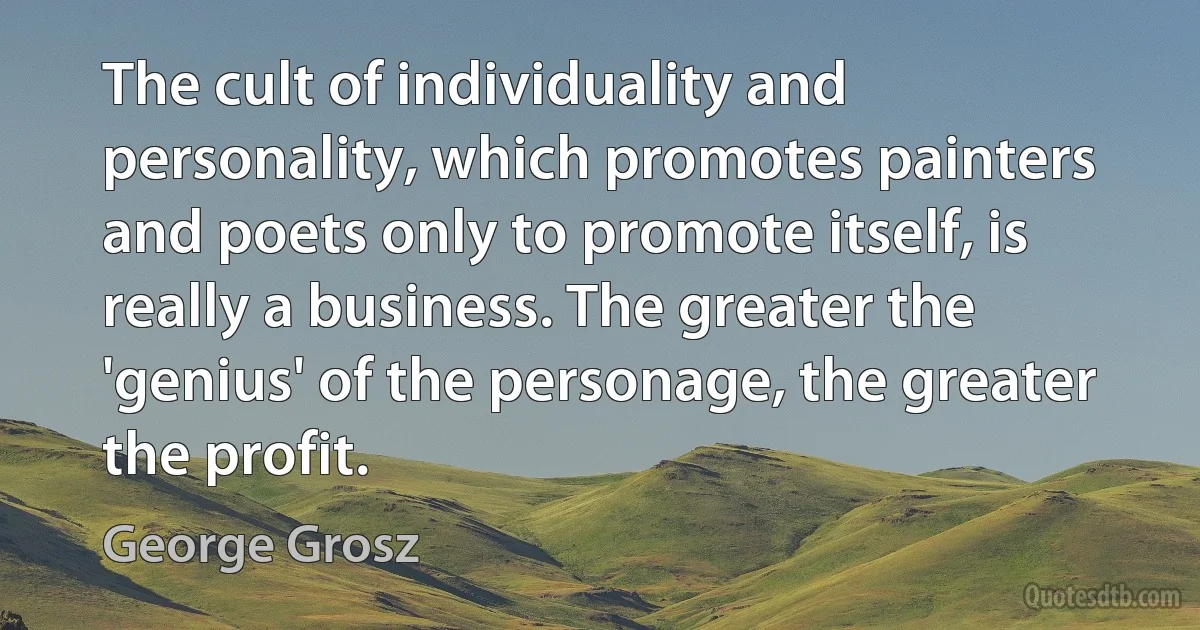Personage Quotes
To invent a story, or admirably and thoroughly tell any part of a story, it is necessary to grasp the entire mind of every personage concerned in it, and know precisely how they would be affected by what happens; which to do requires a colossal intellect: but to describe a separate emotion delicately, it is only needed that one should feel it oneself; and thousands of people are capable of feeling this or that noble emotion, for one who is able to enter into all the feelings of someone sitting on the other side of the table.

John Ruskin
Before the reader is introduced to the modest country medical practitioner who is to be the chief personage of the following tale, it will be well that he should be made acquainted with some particulars as to the locality in which, and the neighbours among whom, our doctor followed his profession.

Anthony Trollope
Yesterday I saw Mr. Thackeray. He dined here with some other gentlemen. He is a very tall man - above six feet high, with a peculiar face - not handsome, very ugly indeed, generally somewhat stern and satirical in expression, but capable also of a kind look. He was not told who I was, he was not introduced to me, but I soon saw him looking at me through his spectacles; and when we all rose to go down to dinner he just stepped quietly up and said "Shake hands”; so I shook hands. He spoke very few words to me, but when he went away he shook hands again in a very kind way. It is better, I should think, to have him for a friend than an enemy, for he is a most formidable-looking personage. I listened to him as he conversed with the other gentlemen. All he says is most simple, but often cynical, harsh, and contradictory.

Charlotte Brontë
There have been periods when the country heard with dismay that "the soldier was abroad." That is not the case now. Let the soldier be abroad; in the present age he can do nothing. Let the soldier be abroad if he will, he can do nothing in this age. There is another personage,-a personage less imposing in the eyes of some, perhaps insignificant. The schoolmaster is abroad, and I trust to him, armed with his primer, against the soldier in full military array, for upholding and extending the liberties of his country.

Henry Brougham, 1st Baron Brougham and Vaux
If we could dredge up something forgotten not only by ourselves but by our whole generation or our entire civilization, we should become indeed the boonbringer, the culture hero of the day-a personage of not only local but world historical moment. In a word: the first work of the hero is to retreat from the world scene of secondary effects to those causal zones of the psyche where the difficulties really reside, and there to clarify the difficulties, eradicate them in his own case (i. e., give battle to the nursery demons of his local culture) and break through to the undistorted, direct experience and assimilation of what C. G. Jung called "the archetypal images." This is the process known to Hindu and Buddhist philosophy as viveka, "discrimination."

Joseph Campbell
Again, your being is never annihilated, but continues to develop its own existence in other ways. A portion of you has lived many lives upon this planet, but the "you" that you know is freshly here, and will never again encounter space and time in precisely the same way. The same applies to each life lived either before or after. Biologically you rest upon a heritage, however, and psychically the same applies. The soul, or this greater personage, does not simply send out an old self in new clothes time and time again, but each time a new, freshly-minted self that then develops and goes its own way. That self rides firmly, however, in the great flight of experience, and feels within itself all of those other fully unique versions that also fling their way into existence.

Robert Butts
There is a scale in the meaning of the word socialist. In France it means about the same thing as a communist, when one uses plain language. When one uses the language of Monsieur Drumont, it means a Jew. In England a socialist is equal to a French conservative republican. In America it means a thief. In Germany it means an ingenious individual of restricted financial resources, who generally fails to blow up some important personage with wet dynamite. In Italy a socialist is an anarchist pure and simple, who wishes to destroy everything existing for the sake of dividing a wealth which does not exist at all. It also means a young man who orders a glass of water and a toothpick at a cafe, and is able to talk politics for a considerable time on this slender nourishment.

Francis Marion Crawford
On the imprisonment of Mahomed, Futteh Khan, assuming the reigns of government, and being formally crowned, was acknowledged King of Kashmeer in the year 902; and appointed Suffy and Runga Ray, the two officers who had lately made their escape, his ministers. About this time one Meer Shumsood-Deen, disciple of Shah Kasim Anwur, the son of Syud Mahomed Noorbukhsh arrived in Kashmeer from Irak. Futteh Khan made over to this holy personage all the confiscated lands which had lately fallen to the crown; and his disciples went forth destroying the temples of the idolaters, in which they met with the support of the government, so that no one dared to oppose them. In a short time many of the Kashmeeries, particularly those of the tribe of Chuk, became converts to the Noorbukhsh tenets. The persuasion of this sect was connected with that of the Sheeas; but many proselytes, who had not tasted of the cup of grace, after the death of Meer Shumsood-Deen, reverted to their idols...

Firishta
Thus we may infer that the only characteristic difference between modern Christianity and the old heathen faiths is the belief of the former in a personal devil and in hell. "The Aryan nations had no devil," says Max Muller. "Pluto, though of a sombre character, was a very respectable personage; and Loki (the Scandinavian), though a mischievous person, was not a fiend. The German Goddess, Hell, too, like Proserpine, had once seen better days. Thus, when the Germans were indoctrinated with the idea of a real devil, the Semitic Seth, Satan or Diabolus, they treated him in the most good-humored way."

Max Müller
I swear to you, you're missing the whole point of the Jesus Prayer. The Jesus Prayer has one aim, and one aim only. To endow the person who says it with Christ-Consciousness. Not to set up some little cozy, holier-than-thou trysting place with some sticky, adorable divine personage who'll take you in his arms and relieve you of all your duties and make all your nasty Weltschmerzen and Professor Tuppers go away and never come back. And by God, if you have intelligence enough to see that - and you do - and yet you refuse to see it, then you're misusing the prayer, you're using it to ask for a world full of dolls and saints and no Professor Tuppers.

J. D. Salinger



